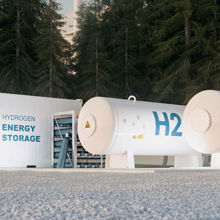Can hydrogen help us rapidly decarbonise our energy systems?
The establishment of a strong hydrogen economy is a very real opportunity and is within reaching distance.


UKIMEA Energy Leader
Mark Neller
Director
Last updated: July 2019
Get in touch with our team
Four years after the COP21 agreement in Paris, the race to replace fossil fuels in nations’ energy networks is intensifying.
As warm words are translated into detailed plans, governments are having to consider every option that might accelerate the transition to affordable, reliable and sustainable energy. Our new report shows that in the U.K. hydrogen will play a significant role in a decarbonised energy future. A model that could be replicated in other economies across the world like Australia, New Zealand and the United States.
In the last two decades the U.K. has made progress in the decarbonisation of its energy system, largely through a switch to wind and solar. Renewables today are competitive on price without subsidy, a major achievement, but 80% of the energy system still relies on fossil fuels. Introducing hydrogen could speed up the decarbonisation process.
Claire Perry
UK Energy and Clean Growth Minister, speaking at an industry event
New fuel, existing network
In energy, legacy is always a brake on change. Over 20 million existing buildings in the U.K. rely on natural gas (methane) for heating, hot water and cooking. Much of heavy industry still relies on methane or other solid fuels as a feedstock for generating high operating temperatures.
To kickstart the market, there are already some obvious ways to introduce the fuel into the existing gas network. Some adaptation would be required, but hydrogen can be blended up to 20% into a methane supply with no need to change existing domestic appliances, and market mechanisms could be established by government regulation to help encourage the fuel’s adoption.
At peak times, the U.K.’s gas network can move six times more energy than the electricity network. It offers considerable existing storage and is very efficient and resilient with few unplanned interruptions to supply. So, it makes perfect sense to reuse as much of this infrastructure as possible, whilst replacing methane with hydrogen, rather than try and replicate this functionality in an entirely electric energy system.
The benefits of hydrogen
- Transport: hydrogen fuel cell buses and taxis would improve air quality in congested urban environments.
- Homes: it could mean lower cost adaptation to net zero power than shifting everyone from gas to renewable electricity.
- Governments: hydrogen could be a quick and effective way of accelerating their ability to meet climate change commitments made.
From viable to desirable
Hydrogen power is clearly viable, credible and desirable. Supply isn’t problematic. In fact, Arup already is working on a number of commissions exploring both production and supply.
The next step is to develop business models and government policies to support its implementation, explaining the benefits to industry, suppliers and consumers. Energy providers and government policy makers need to join forces to explore how hydrogen can unlock their common goals, provide value for the taxpayer and reduce industry risk.
Establishing a hydrogen economy
Our report uses the UK as a case study example and explores the challenges and opportunities for hydrogen in the context of the whole energy system

Insights
Explore more energy insights
Power Systems Transformation: Delivering Competitive, Resilient Electricity in High-Renewable Systems

AI for Future Cities: Energy

Water security for energy and industry: challenges and solutions in the Humber, UK

Offshore transmission: How do we move towards investing, planning and delivering offshore assets with confidence?


